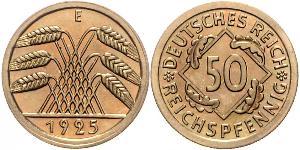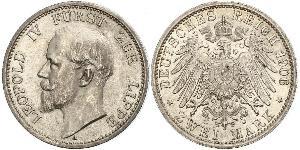1 Марка (продана за $11.0)
1924-F, Germany (Weimar Republic). Silver 1 Mark Coin. Cleaned/Toned XF!
Mint Year: 1924 Denomination: 1 Mark Mint Place: Stuttgart (F) Reference: KM-42 ($26 in XF!) Condition: Lightly wiped/cleaned and toned, otherwise XF! Material: Silver (.500) Diameter: 23mm Weight: 4.96gm
Obverse: Value numeral (1) / in words ("three mark") above date (1924). Initial (F) of the Stuttgart mint below. Legend: DEUTSCHES REICH . Reverse:German heraldic eagle.
Weimar Republic (German: Weimarer Republik) is an unofficial, historical designation for the German state as it existed between 1919 and 1933. The name derives from the city of Weimar, where its constitutional assembly first took place. The official name of the state remained Deutsches Reich, unchanged since 1871. In English the country was usually known simply as Germany.
A national assembly was convened in Weimar, where a new constitution for the Deutsches Reich was written, and adopted on 11 August 1919. In its fourteen years, the Weimar Republic faced numerous problems, including hyperinflation, political extremism (with paramilitaries – both left- and right-wing), as well as contentious relationships with the victors of the First World War. The people of Germany blamed the Weimar Republic rather than their wartime leaders for the country's defeat and for the humiliating terms of the Treaty of Versailles. Weimar Germany fulfilled most of the requirements of the Treaty of Versailles although it never completely met its disarmament requirements, and eventually paid only a small portion of the war reparations (by twice restructuring its debt through the Dawes Plan and the Young Plan). Under the Locarno Treaties, Germany accepted the western borders of the republic, but continued to dispute the Eastern border.
From 1930 onwards President Hindenburg used emergency powers to back Chancellors Heinrich Brüning, Franz von Papen and General Kurt von Schleicher. The Great Depression, exacerbated by Brüning's policy of deflation, led to a surge in unemployment. In 1933, Hindenburg appointed Adolf Hitler as Chancellor with the Nazi Party being part of a coalition government. The Nazis held two out of the remaining ten cabinet seats. Von Papen as Vice Chancellor was intended to be the "éminence grise" who would keep Hitler under control, using his close personal connection to Hindenburg. Within months the Reichstag Fire Decree and the Enabling Act of 1933 had brought about a state of emergency: it wiped out constitutional governance and civil liberties. Hitler's seizure of power (Machtergreifung) was permissive of government by decree without legislative participation. These events brought the republic to an end: as democracy collapsed, a single-party state founded the Nazi era.
Only 1$ shipping for each additional coin purchased!

|
Добавил:
anonymous 2018-07-24 |
|
||
|
||
|
||
5 Пайса Непал Медь
в группе 4 монет / 3 цен
⇑

-600-300-kG0KqUpYfuQAAAFkvQqI0srl.jpg)

-300-150-ZREKX9ISyewAAAFT_AHTZ2Sl.jpg)
 Deutsch
Deutsch Русский
Русский Українська
Українська English
English Italiano
Italiano Français
Français Español
Español 汉语
汉语













